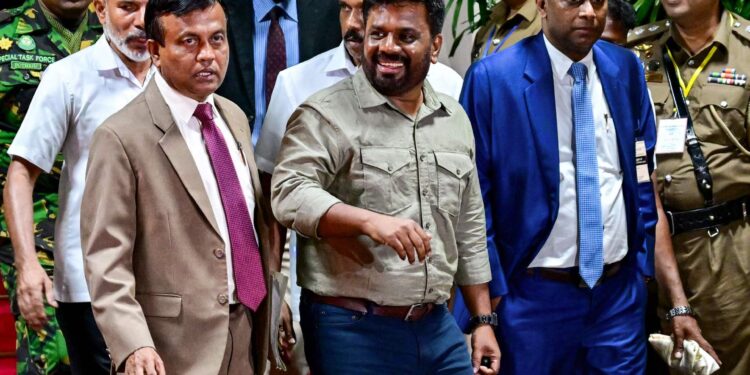The leader of the leftist coalition, Anura Kumara Dissanayake (55 years old), who announced Sunday that he had won the presidential elections in Sri Lanka, promised not to cancel the unpopular agreement signed with the International Monetary Fund against the backdrop of the country’s financial crisis.
After the vote count was completed, Marxist candidate Dissanayake won 42.3% of the vote, the electoral commission announced on its website.
Opposition leader Sajith Premadasa, 57, came in second with 32.76% of the vote, while outgoing President Ranil Wickremesinghe, 75, came in third with 17.27%.
“This victory is our victory,” Dissanayake wrote on Twitter shortly after his victory was announced. “Together we are ready to rewrite the history of Sri Lanka.” He will be formally inaugurated on Monday morning, according to the election commission.
Even before the results were out, Dissanayake announced that he would not “tear up” the $2.9 billion bailout signed with the International Monetary Fund in 2023 after long negotiations.
“We will not cancel the IMF plan,” Bimal Ratnayake, a politburo member of the leftist People’s Liberation Front party, told AFP. “Our desire is to cooperate with the fund and make certain adjustments.”
During his election campaign, Dissanayake condemned the “corrupt” leaders he believed were responsible for the chaos of 2022, and promised to reduce taxes and duties on food products and medicines because of their impact on the population.
“I believe this election will be the biggest turning point in the history of Sri Lanka,” he said confidently on Saturday as he cast his vote in the capital, Colombo.
economic crisis
In 2022, Sri Lanka experienced the worst economic crisis in its history, leading to street protests and the eventual ouster of then-President Gotabaya Rajapaksa, whose palace was besieged and stormed by angry protesters over inflation and supply shortages, prompting him to flee the country.
He was succeeded by Wickremesinghe, who led a harsh austerity policy, increasing taxes and drastically cutting public spending.
During his two years in office, Wickremesinghe managed to restore calm to the streets.
The IMF said reforms introduced by Wickremesinghe’s government were beginning to bear fruit, with growth slowly returning.
But the bailout has left millions of Sri Lankans struggling to survive. The World Bank says the start of Sri Lanka’s recovery has led to a rise in poverty, which now affects more than a quarter of the country’s 22 million people.
Wickremesinghe has fought a tough battle to stay in office and continue measures that have stabilized the country’s economy and ended months of shortages of food, fuel and medicine.
“I have brought this country out of bankruptcy,” Wickremesinghe said after casting his vote. The outgoing president had no immediate reaction until Sunday to the initial results, which showed him largely defeated.
The elections witnessed a high turnout of about 76%, according to the Electoral Commission.
Many voters in the capital Colombo and its suburbs on Saturday expressed their dissatisfaction and fatigue with the restrictions that have been in place for two years.
Like Dissanayake, opposition leader Sajith Premadasa has promised to renegotiate the terms of the IMF plan if he wins.
But the fund appeared unwilling to make changes to the 2023 agreement.



